Arizona Student Environmental Coalition
The Arizona Student Environmental Coalition (ASEC) is a political action organization made up entirely of college students in the state of Arizona. The group believes that Arizona must transition from a fossil fuel economy to a clean energy economy, which for them means a prompt phase-out of coal fired electricity and the creation of a vibrant new solar industry. ASEC is a group of diligent citizens, safeguarding their local and global environment for future generations and for their own future on this planet.
Student Organization Profile | Facebook
Energy Club at ASU
The purpose of the Energy Club is to keep its members actively engaged with and abreast of economic, social, technological, and policy issues affecting the energy sector and to educate students about the grand challenges impacting the global energy sector. The Energy Club provides a forum for interdisciplinary student discussion, interaction, and engagement related to global energy issues.
Student Organization Profile | Website | Facebook | Twitter
Engineers Without Borders, ASU Chapter
Engineers Without Borders, ASU chapter, is a non-profit humanitarian organization established to partner with developing communities to improve their quality of life through implementation of environmentally and economically sustainable engineering projects. The group connects university students, ASU faculty, and industry professionals to applied projects.
Student Organization Profile | Website
Global Water Brigades
Water Brigades is one of many programs in Global Brigades, the world's largest student-led global health and sustainable development organization. Water Brigades works to prevent water related illnesses in communities with limited access to clean water, by helping with planning, design, and construction of water systems. Additionally the group provides education and training so that the community can properly administer, operate, maintain, and sustain their water system.
Student Organization Profile | Website
GlobalResolve
GlobalResolve works together with a range of partners to develop sustainable technologies and programs in the areas of energy, clean water, and local economic development for rural communities in the developing world.
Student Organization Profile | Website
GreenLight Solutions
GreenLight Solutions is a student-run sustainability consulting service that exists to enable sustainability minded undergraduate and graduate students at ASU to apply their education, through consulting projects, to help organizations to operate more sustainably.
Student Organization Profile | Website
Local to Global Justice
This group’s primary goal is to educate ASU students and the greater community about issues of local and global justice, while promoting diversity, freedom of speech, and academic freedom of discussion. The group believes it is vital to connect local diversity, sustainability, and social justice issues to larger global struggles.
Student Organization Profile | Website | Facebook
Nourish International at ASU
Nourish International at ASU works to eradicate poverty by engaging students and empowering communities. Nourish serves to help students take a stand against the poverty crisis in a tangible way. By actively engaging in social entrepreneurship, the group works alongside developing communities to implement sustainable development projects, serving as a resource and catalyst for communities.
Student Organization Profile | Website
Real Food ASU
Real Food Challenge is a nationwide non-profit grassroots leadership project. Real Food's goal is to address topics within food systems, especially local, humane, fair, and ecologically sound food. The group works toward an understanding of what type of food system nourishes the producers, consumers, community, and earth.
Student Organization Profile | Website |Facebook | Twitter
Sun Devils for Wildlife Conservation
This group’s goal is to spread awareness of the importance of wildlife conservation through active participation in legislation and to assist local conservation groups financially and physically through fundraising and volunteer efforts. Additionally, the group works with several animal rights organizations to improve the treatment of animals in Arizona.
Facebook
U.S. Green Building Council, ASU Chapter
USGBC Students is an official organization of the U.S. Green Building Council. The organization fosters education, community involvement, scientific study, and research in the field of environmentally sustainable building. ASU’s chapter has a goal to help students at ASU gain the knowledge needed to become LEED Accredited through study sessions, educational workshops, and practice tests.
Student Organization Profile | Website
Back to all student sustainability clubs »
 On September 27, 2013, visual artist and Arizona native Paul Nosa visited the Global Institute of Sustainability and the ASU Art Museum for a sewing performance with his Solar Sewing Rover. The sewing machine is portable and powered by a solar panel or a bicycle with an electric generator. Nosa is currently on a cross-country tour to promote people’s creativity, providing a tangible sewn patch of their ideas, and to teach how to use alternative energy sources.
On September 27, 2013, visual artist and Arizona native Paul Nosa visited the Global Institute of Sustainability and the ASU Art Museum for a sewing performance with his Solar Sewing Rover. The sewing machine is portable and powered by a solar panel or a bicycle with an electric generator. Nosa is currently on a cross-country tour to promote people’s creativity, providing a tangible sewn patch of their ideas, and to teach how to use alternative energy sources.

 To encourage and reward candidates for the
To encourage and reward candidates for the 
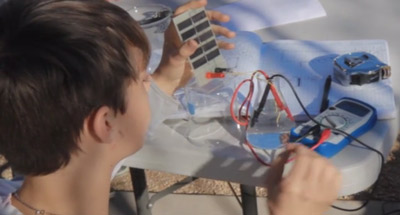 In School of Sustainability professor
In School of Sustainability professor 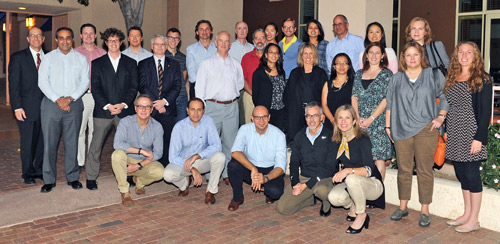 TEMPE, Ariz. — October 22, 2013 — Tasked with determining how best to invest global money in developing countries, the International Finance Corporation (IFC) consulted Arizona State University (ASU) for expert sustainability advice, October 15-16 at ASU.
TEMPE, Ariz. — October 22, 2013 — Tasked with determining how best to invest global money in developing countries, the International Finance Corporation (IFC) consulted Arizona State University (ASU) for expert sustainability advice, October 15-16 at ASU.

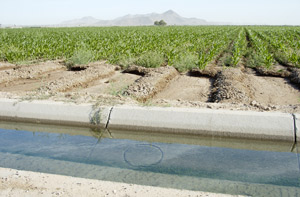 With water levels dipping in Lake Mead and population growth at an all-time high, policymakers, government agencies, and growers need to be equipped with proper water-saving agriculture and agro-ecosystem methods. To provide guidance on crop variations and water-conserving cropping patterns, Senior Sustainability Scientist
With water levels dipping in Lake Mead and population growth at an all-time high, policymakers, government agencies, and growers need to be equipped with proper water-saving agriculture and agro-ecosystem methods. To provide guidance on crop variations and water-conserving cropping patterns, Senior Sustainability Scientist 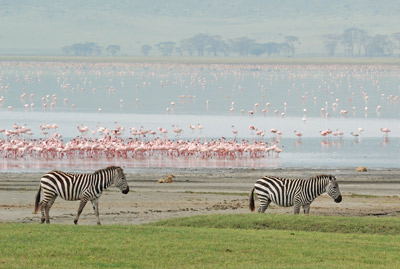 Arizona State University scientists and student researchers are welcome to enter their environmental conservation projects in the
Arizona State University scientists and student researchers are welcome to enter their environmental conservation projects in the 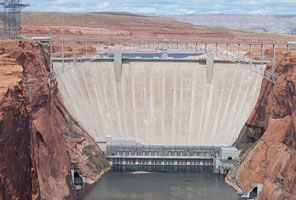 Arizona Republic environmental reporter Brandon Loomis investigates the wicked problem of keeping or destroying Glen Canyon Dam, a decision that seems to have no positive outcomes. Water managers, some scientists, and activists would like to see the dam removed in order to drain Lake Powell and feed a drought-stricken Lake Mead, a water source for major cities including Las Vegas and Phoenix. Draining Lake Powell would also return Glen Canyon to its former, natural glory.
Arizona Republic environmental reporter Brandon Loomis investigates the wicked problem of keeping or destroying Glen Canyon Dam, a decision that seems to have no positive outcomes. Water managers, some scientists, and activists would like to see the dam removed in order to drain Lake Powell and feed a drought-stricken Lake Mead, a water source for major cities including Las Vegas and Phoenix. Draining Lake Powell would also return Glen Canyon to its former, natural glory.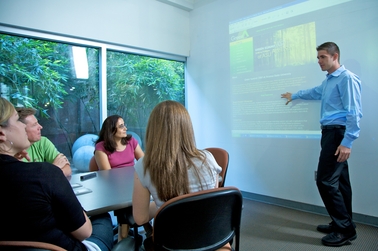 For many who enroll in ASU's School of Sustainability, making a difference in the world is a top priority. The School allows students to design their own academic path based on the type of the career they want, whether it be in energy, food, waste, policy, economics, or international development.
For many who enroll in ASU's School of Sustainability, making a difference in the world is a top priority. The School allows students to design their own academic path based on the type of the career they want, whether it be in energy, food, waste, policy, economics, or international development.
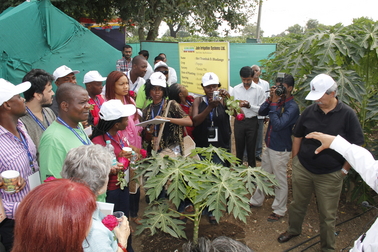 TEMPE, Ariz. — October 15, 2013 — The annual Empowerment for Peace through Leadership in Agribusiness and Sustainability (EmPeace LABS) conference takes place October 19-26 in Maharashtra, India to connect global farmers in a network that will further sustainable farming methods and establish peaceful communities in developing countries.
TEMPE, Ariz. — October 15, 2013 — The annual Empowerment for Peace through Leadership in Agribusiness and Sustainability (EmPeace LABS) conference takes place October 19-26 in Maharashtra, India to connect global farmers in a network that will further sustainable farming methods and establish peaceful communities in developing countries.
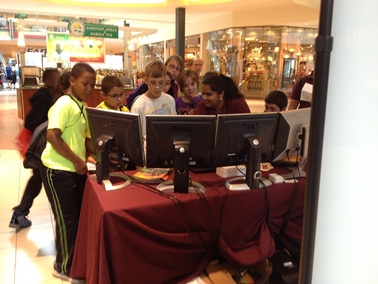 At the National Science Foundation's "Change the World: Science and Engineering Careers Fair" in Virginia, representatives from ASU's Decision Center for a Desert City (DCDC) inspired young students to consider science, technology, engineering, and math (STEM) career paths.
At the National Science Foundation's "Change the World: Science and Engineering Careers Fair" in Virginia, representatives from ASU's Decision Center for a Desert City (DCDC) inspired young students to consider science, technology, engineering, and math (STEM) career paths.

 Environmental Reporter Brandon Loomis investigates the wicked problem of keeping or destroying Glen Canyon Dam, a decision that seems to have no positive outcomes. Water managers, some scientists, and activists would like to see the dam removed in order to drain Lake Powell and feed a drought-stricken Lake Mead, a water source for major cities including Las Vegas and Phoenix. Draining Lake Powell would also return Glen Canyon to its former, natural glory.
Environmental Reporter Brandon Loomis investigates the wicked problem of keeping or destroying Glen Canyon Dam, a decision that seems to have no positive outcomes. Water managers, some scientists, and activists would like to see the dam removed in order to drain Lake Powell and feed a drought-stricken Lake Mead, a water source for major cities including Las Vegas and Phoenix. Draining Lake Powell would also return Glen Canyon to its former, natural glory.
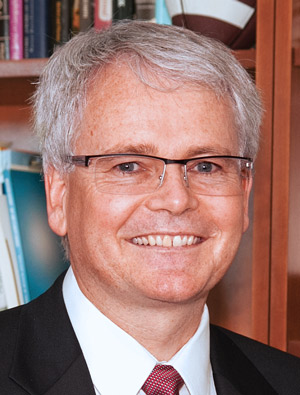 Christopher Boone, a noted scholar on sustainable urbanism, environmental health, and environmental justice, has been serving as interim dean since July 2013. Boone is also a professor in the School of Sustainability and School of Human Evolution and Social Change and co-principal investigator of the
Christopher Boone, a noted scholar on sustainable urbanism, environmental health, and environmental justice, has been serving as interim dean since July 2013. Boone is also a professor in the School of Sustainability and School of Human Evolution and Social Change and co-principal investigator of the